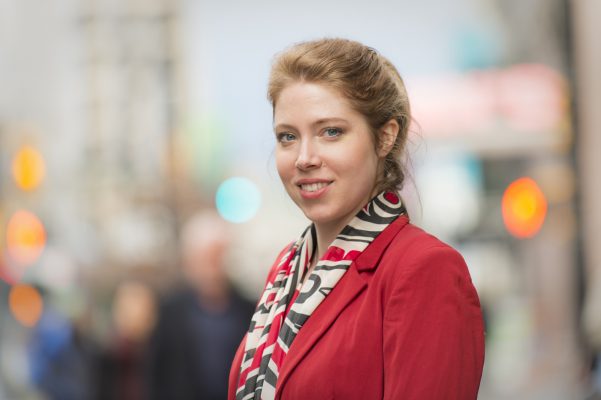Sarah Lubik: TD Canada Trust Distinguished Teaching Award winner 2016
Sep 14, 2016
Sarah Lubik is in the business of creating entrepreneurs.
As Director of Entrepreneurship for SFU, Lubik is tasked with not only implementing SFU’s innovation agenda, but also supporting and developing SFU’s curricular and co-curricular entrepreneurship offerings.
Recently appointed as one of ten Innovation Leaders to assist on the Government of Canada’s Innovation Agenda, Lubik is now also invested in helping nurture the entrepreneurial talents of Canada’s current and future generations.
Her knowledge of and passion for the subject recently garnered her a TD Canada Trust Distinguished Teaching award, the highest teaching honour at the Beedie School of Business.
In the first of a two-part interview, Lubik talks about her path to becoming one of Canada’s foremost experts in teaching entrepreneurship and innovation.
Did you always want to teach?
No, though my mom always told me I should. My path has been pretty winding to get here. I thought I’d go to law school, then my co-op doing research on advanced technology startups took me to Cambridge (UK) where I liked research so much that I ended up first in a Masters and then a PhD program looking into commercialization and working in startup support.
My supervisor was looking out for me, knowing if I wanted an academic job then I’d need teaching experience. It turned out that I loved it, especially when I got to SFU and started teaching more experiential classes.
What would you say your teaching style is?
I think as a teacher, I’m more a guide or coach. In entrepreneurship, it’s pivotally important to get students out of the classroom, testing their assumptions, making mistakes, learning to understand people and solve real problems. Students come back to class and it’s less about what I know about what they are interested, but how they advanced their own understanding, and how realistic and ambitious their plans and actions are.
What sort of projects do you like to set your students?
Hands-on and self-driven. My classes focus on having students understand and address problems they care about, whether that’s social isolation – which often comes up in the 200 level classes – or being matched to a startup company in a field they are interested in, to working on their own venture, to finding a market need and a business model for their own research at the grad level.
One of the only criteria I have for what you can work on is that you address a real market or societal need – and ideally both. If you don’t, you need to pivot.
Do you employ any innovative or unusual teaching methods?
I think what I do that is unique is that as a teacher, I am more of a coach. A lot of what I do is about enabling students to innovate on their own, making sure they know how to ask the right questions, where to start – and when you don’t know where to start, to just start anywhere. A lot of it is about mindset change: making sure they are not scared to be wrong, to tell other people their ideas; to get feedback as quickly as possible and be open to it; to show people half made prototypes; to ask each other for help; and to try to find teammates they need to make things go forward.
I had a student recently describe my Startup Experience class by saying it felt like he spent Friday mornings in a really good incubator. That was a huge seal of approval for me and how I teach.
The other thing that is unique about what I do, and what the rest of the SFU Innovates team does, is that we are actively encouraging and supporting interdisciplinary teams from students’ second semesters at SFU. We are allowing students to play a variety of roles in those teams, to really make use of the variety of talent and skills we have available and teach respect and appreciation for those skills, as well as how to work with people that see the world very differently from you. That is a very powerful skillset to have even before you leave university.
What does winning the TD Canada Trust Distinguished Teaching award mean to you?
To be honest, it has been something I have been hoping for since I knew it existed at Beedie. I think it might be one of the most meaningful awards you can be given. The people who I joined as winners of the award are the people I would look to as inspiration. To be part of that same club is humbling, and it will definitely encourage me to pick up my game so I continue to feel that I deserve to be part of it.

